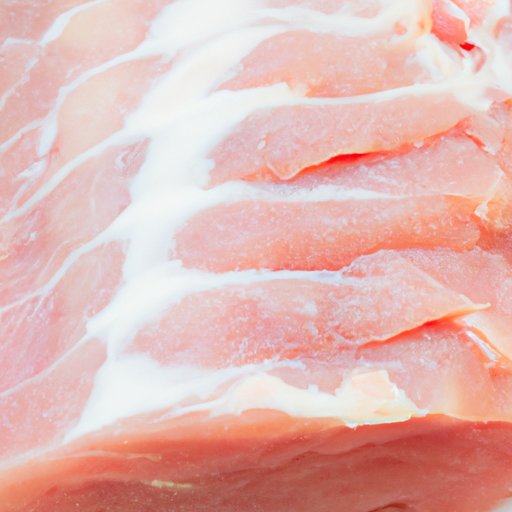Introduction
Pork has long been considered a staple in many diets around the world. It is a versatile, flavorful, and affordable source of animal protein that can be cooked in many different ways. But is pork healthy? In this article, we’ll explore the nutritional content of pork and its potential health benefits, as well as the potential risks of eating too much pork.

A Nutritional Comparison of Pork vs Other Meats
Pork is a type of red meat, along with beef and lamb. Red meats are typically higher in fat and calories than white meats like poultry and fish. But when compared to other red meats, pork is relatively low in fat and calories. A 3-ounce serving of pork contains about 140 calories and 5 grams of fat, while the same portion of beef or lamb contains about 200 calories and 10 grams of fat. Pork also contains a good amount of protein—about 21 grams per 3-ounce serving—as well as B vitamins and minerals like selenium and phosphorus.

Health Benefits of Eating Pork
In addition to its lower fat and calorie content, pork is also an excellent source of high-quality protein. Protein is essential for growth and repair of tissues, and it helps build and maintain muscle mass. Pork is also a good source of B vitamins like thiamin, riboflavin, niacin, and vitamin B6, which are important for energy production and immune function. Pork is also a good source of minerals like zinc, which is important for wound healing, and iron, which helps carry oxygen throughout the body.
How Does Pork Compare Nutritionally to Other Animal Proteins?
When compared to other animal proteins, pork has a slightly higher fat content than both chicken and fish. However, the type of fat found in pork is mostly monounsaturated and polyunsaturated fats, which have been linked to a reduced risk of heart disease. Pork also has a slightly higher calorie content than chicken, but it’s still lower than beef and lamb.

Exploring the Pros and Cons of Eating Pork
Eating pork can provide several health benefits, including providing high-quality protein and essential vitamins and minerals. However, there are some potential drawbacks to eating too much pork, such as its higher fat content, which can raise cholesterol levels. And since pork is a red meat, it has been linked to an increased risk of certain cancers, such as colorectal cancer.
Is Pork Good for Your Health?
Overall, moderate consumption of pork can be part of a healthy diet. The key is to limit your intake of fatty cuts of pork, like bacon and sausage, and opt for leaner cuts, such as pork tenderloin. Eating leaner cuts of pork can help reduce your risk of certain diseases, such as heart disease and certain types of cancer.
The Role of Pork in a Balanced Diet
If you’re looking to add pork to your diet, the American Heart Association recommends limiting your intake to no more than 4 ounces (about 113 grams) per day. To keep your intake of saturated fat and cholesterol low, choose lean cuts of pork and trim off any visible fat. You can also opt for lean ground pork instead of regular ground pork to cut down on fat and calories. For a healthy, balanced meal, serve pork with vegetables and whole grains, such as brown rice or quinoa.
Conclusion
Pork can be a healthy addition to your diet if eaten in moderation. It’s an excellent source of quality protein and essential vitamins and minerals, and it can be a great alternative to red meats like beef and lamb. Just be sure to choose leaner cuts of pork and limit your intake to no more than 4 ounces per day. With a few simple changes, pork can be a healthy and tasty part of your diet.
(Note: Is this article not meeting your expectations? Do you have knowledge or insights to share? Unlock new opportunities and expand your reach by joining our authors team. Click Registration to join us and share your expertise with our readers.)
